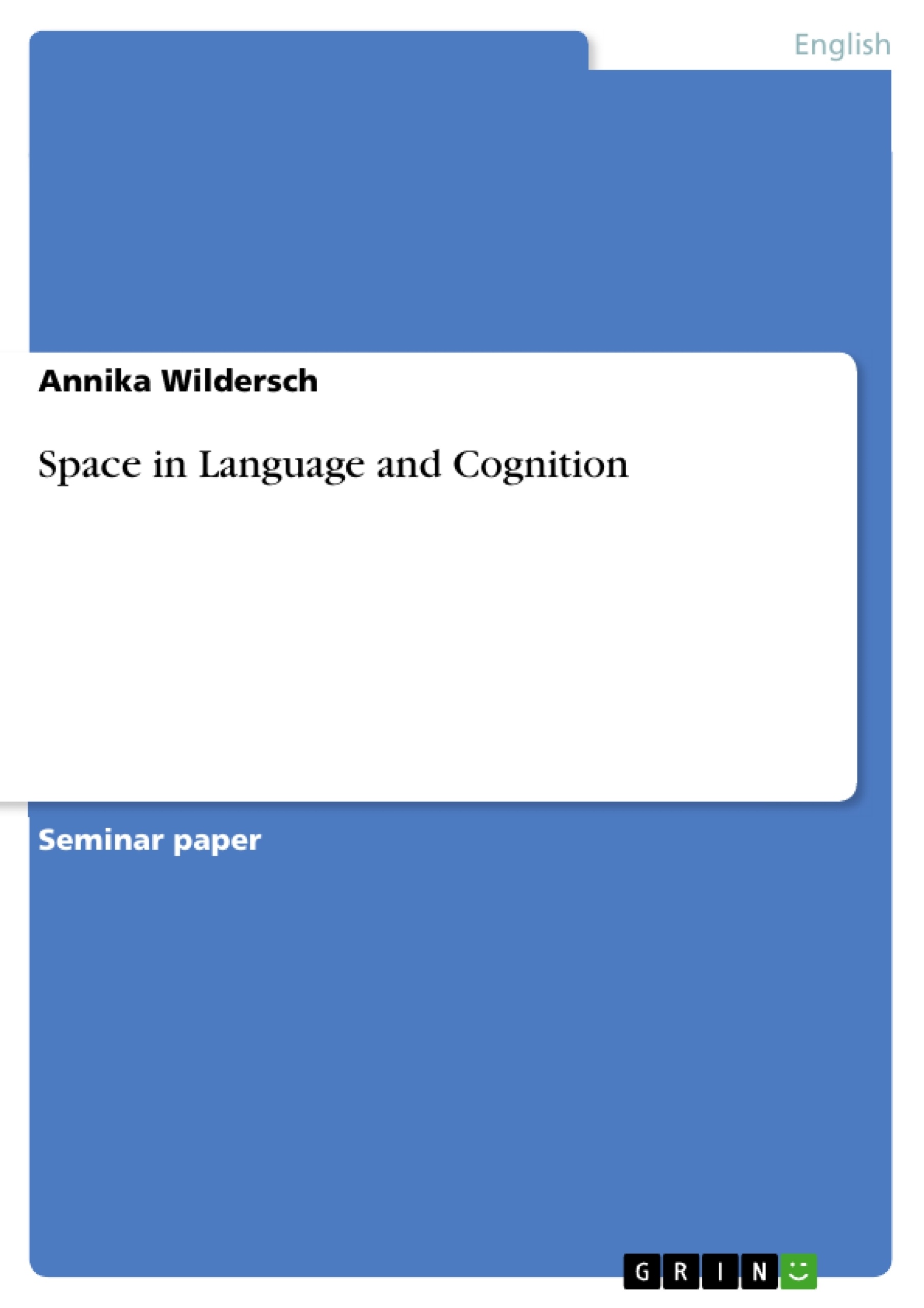This term paper deals with the debate between two opposing viewpoints about the causation between language and cognition in the spatial domain. The first perspective is called linguistic relativity, which holds that the structure of a language influences the cognitive processes of the speakers and affects the ways in which they conceive the world. In other words, the principle of linguistic relativity claims that language shapes the way we think. This standpoint will be represented by articles from research groups around the linguists Eric Pederson and Stephen Levinson (Pederson et al., 1998; Levinson et al., 2002).
The opposing stance contains the universalist notion that all languages are broadly similar and linguistic systems are merely the formal and expressive medium that speakers use to describe their mental representations. Hence, linguistic coding cannot have effects on cognition but reflects antecedently existing conceptual distinctions. This attitude is conveyed by the psychologists Peggy Li and Lila Gleitman (Li & Gleitman, 2002), who argue that “it’s the thought that counts” (ibid, 291).
The paper is structured in the following way. To explain the basis of the debate, the main part opens with an introduction of the different frames of reference that are employed in distinct languages to convey spatial information. Next, Pederson’s experiments and interpretations about the effect of spatial coding in language on cognition are presented. Then, a reinterpretation of these findings and further experiments by Li and Gleitman are outlined. Finally, a critical comment by Levinson on Li and Gleitman’s analysis will show how he defends the position of linguistic relativity in the domain of spatial coding. In the concluding chapter of this paper, a summary of the debate will be provided, accompanied by a discussion about the transferability on the general relation between language and cognition.
Inhaltsverzeichnis (Table of Contents)
- Introduction
- Spatial reasoning and language
- Frames of reference: linguistic diversity in spatial coding
- Linguistic relativity: Pederson's findings and interpretations
- Universal findings: Li and Gleitman's contraposition
- Defending linguistic relativity: Levinson's answer.
- Discussion
- Literature
Zielsetzung und Themenschwerpunkte (Objectives and Key Themes)
This paper examines the relationship between language and cognition, particularly focusing on the impact of spatial coding in language on human thought. The central question is whether language influences our perception of space, or vice versa. It explores two contrasting perspectives: linguistic relativity and universalism, with specific research findings from groups around linguists Eric Pederson and Stephen Levinson, as well as psychologists Peggy Li and Lila Gleitman.
- The influence of language on spatial cognition.
- The different frames of reference employed by languages to express spatial information.
- The debate between linguistic relativity and universalism in the context of spatial coding.
- The role of cultural influences on spatial reasoning.
- The implications of these findings for the broader understanding of the language-cognition relationship.
Zusammenfassung der Kapitel (Chapter Summaries)
- Introduction: This chapter provides an overview of the historical and contemporary debate about the relationship between language and cognition, particularly in the domain of spatial reasoning. It introduces the key concepts of linguistic relativity and universalism, highlighting the opposing perspectives on the causal relationship between language and thought.
- Spatial reasoning and language: This chapter delves into the diversity of spatial coding across different languages. It discusses Pederson's "men-and-tree-game" as a tool to demonstrate how different languages employ distinct frames of reference (relative, intrinsic, and absolute) to describe spatial relationships. The chapter focuses on languages that utilize the absolute frame of reference, which relies on cardinal directions rather than body-centered coordinates.
Schlüsselwörter (Keywords)
The main keywords and focus topics of the text include linguistic relativity, universalism, spatial coding, frames of reference, cognitive psychology, language acquisition, cultural influences, and the relationship between language and thought.
Frequently Asked Questions
What is the central debate of this paper?
The paper explores the debate between linguistic relativity (language shapes thought) and universalism (thought exists independently of language) in the domain of spatial cognition.
What are the three main frames of reference in spatial coding?
Languages typically use three frames of reference: relative (left/right/front/back), intrinsic (based on an object's own parts), and absolute (cardinal directions like North/South).
Who represents the linguistic relativity perspective in this study?
The works of linguists Eric Pederson and Stephen Levinson represent this view, arguing that the language one speaks influences spatial reasoning.
What was Peggy Li and Lila Gleitman's counter-argument?
They represent the universalist stance, arguing that "it's the thought that counts" and that linguistic coding reflects existing conceptual distinctions rather than creating them.
What is the "men-and-tree-game"?
It is an experimental tool used by Pederson to demonstrate how speakers of different languages employ distinct frames of reference to describe the position of objects.
How does culture influence spatial reasoning according to the text?
The paper discusses how cultural environment and language structure work together to determine whether a speaker relies on egocentric coordinates or absolute cardinal directions.
- Quote paper
- Annika Wildersch (Author), 2015, Space in Language and Cognition, Munich, GRIN Verlag, https://www.hausarbeiten.de/document/311759


